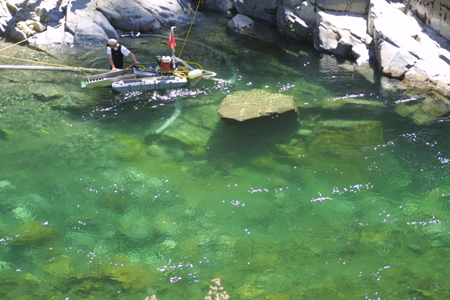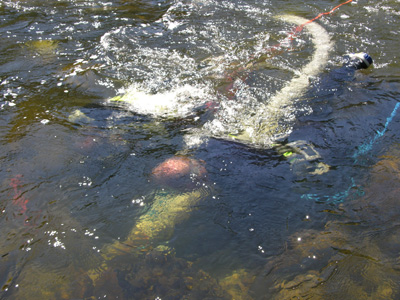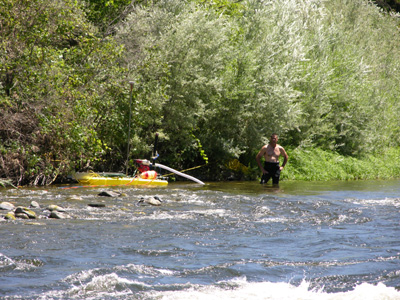BY GENE MEDENWALD
Yesterday’s production was nine pennyweights and 22 grains–just a tad shy of one-half ounce of gold. This was the very best I’d ever done with my five-inch suction dredge. The very best I’d ever done in my life! I was excited. I was obviously getting into a really good pay-streak. The gold was less than half fines, with a lot of wheat kernel-sized pieces, and a few quarter and half-pennyweight chunkies, some attached to quartz.
 Things were going good and looking better. Yesterday had been a long day, but not as long as I was able to work; about three and a half tanks of gasoline or seven hours. Today, as planned after the gold weigh-up last night, I was at the river early, determined to put in at least a four-tank day . . . and pull my first half-ounce of gold in a day!
Things were going good and looking better. Yesterday had been a long day, but not as long as I was able to work; about three and a half tanks of gasoline or seven hours. Today, as planned after the gold weigh-up last night, I was at the river early, determined to put in at least a four-tank day . . . and pull my first half-ounce of gold in a day!
Though the water’s flow was quite strong and the water deep, I had an excellent hole developed and it was comfortable working it. I was developing cuts forward and to the right. First, a layer of sand and small cobbles, then down through a layer of gray and blackish clay-like old hydraulic mine tailings, and finally into a beautiful yellow/orange boulder-strewn hard-pack laden with flecks of yellow gold throughout–and last, onto crevassed and jagged bedrock where the wheat kernels and golden chunkies were. Man, this was FUN! This is what gold mining should be. This is what people have been telling me it is like, and all of this time I kept wondering if it was true and if it would ever happen to me. Now I am really doing it and it is wonderful . . . thoughts like these were running through my mind when suddenly: WOW! Something is pulling on my suction hose. Pulling strong! This is weird. I can’t hold it back! I’m being pulled out of my hole! Rats, it slipped out of my hand. Sheez, now it’s pulling on my airline! I’m on my back, now buffeted and rolling about in the current.
Don’t panic! You’ve still got air. Clear your mask so you can see! Where am I?
That huge boulder; I must be about 15 feet from the ledge; on the other side of the boulder, just a ways, where it is only four feet of water and mild current–get there! I was slowly moving by laborious and exasperating crawling against the strong current, slipping and sliding over the slick and mossy rocks, resisting the constant pulling on the air hose. And while doing so, I was thinking, a little more calmly now, will the strong air line break? If it does, I can always drop my weights and “bail out;” where’s the weight belt buckle, dummy? Yeah, the weights are all at your stomach, the buckle is at your back; pull the belt around so if that air line pops, you can reach the buckle.
Totally exhausted, I finally, made it to the boulder and to the shallow, quiet water and stood up and automatically raised my face mask and spit out the regulator to gasp for open, unrestricted air — and was SHOCKED and dumfounded to discover I was standing in a deluge of water, blasting at me from the sky! And the smell, the foul, disgusting odor, the stench; ack, gasp, gag! Drop the weight belt, the mask, the regulator, the everything and swim the hell away from there!
That is a very brief description of how I experienced and survived an example of Murphy’s Law and several of its corollaries that day.
Experiencing it was frightening — fright caused by what was happening to me physically, fright caused by fear of the unknown. (What in the HECK is going on? Did my hi-line break? Is my dredge towing me downstream to the rapids?) Experiencing it was also incredibly physically exhausting, and nearly debilitating from stench-induced vomit. The cause of all this was simplicity itself: the pressure hoses blew off the dredge pump. No big thing. Murphy’s Law: If anything can go wrong, it generally will!
A miner’s suction dredge is, of course, a machine. Lots of moving parts. Lots of things to go wrong. But I was dredging three-fourths of the way across the river; and when a pressure hose blows off the pump of a five-inch dredge with the engine going wide open, and with the current and the hi-line set up just right (just wrong?), the whole dredge becomes a jet boat and zooms before the immense force of water being blown from the pump with great power. In my instance, it dragged me 30 feet across the river bottom, and of course (Murphy’s Law), lodged against the bank, in a backwater eddy chock full of floating long-dead fish and eels, carcasses so rotten that the water intake simply sucked them to pieces and the pump blew them into a huge spume of a rainbow-like arch of solid water under which, by chance (Murphy’s Law), I had the misfortune to surface!
What an experience!
And what a horrible job it was to correct everything and get back to mining for gold.
I reeked of dead fish. There were particles of stinking dead fish and eels all over my wetsuit, and all over my mask (when I finally recovered it after an hour’s search with my spare and snorkel) and the regulator/mouth piece. I had to completely disrobe and wash all of this with lots of soapy water in my clean-up tub. Then I had to hike back to camp for my chest waders so I could extract the dredge from the backwater eddy and the mushed-up rotten fish stew. The Law did display a little grace (pity?) though; because the dredge engine quit running shortly after I surfaced and I at least did not have to wade into the rotten fish stew to turn it off. It was a big job representing a lot of unproductive labor, but I eventually did get back into the river again that day and was able to run one more tank of gas before dark. Needless to say, I did not reach my goal of one-half ounce of gold that day.
At the time when this event occurred, two seasons ago, I must admit I rather soundly cursed Murphy’s Law and all of the gods of wayward, askance, and evil fortune. But on reflection, was it really The Law or just dumb o1′ me?
I had been advised and warned about that pressure hose. I really had. I did nothing about the advice. It was an old but serviceably-good dredge. The flange on the pump had been reduced in size from years of tightening. The pressure hose was old and stiff, and it was really too short.
How silly we are at times, to our own detriment. After several more “blow offs,” I eventually replaced the hose with a longer one, which was cheap and thin and kept getting holes in it which reduced suction intensity . . . only to finally replace that one with a correctly-specified one which again blew off because of the small flange. Finally, I simply had a miner-friend weld on a threaded pipe nipple and used a fire hose fitting like those on the newer dredges.
I could have done that simple alteration before I ever put the dredge in the water that season . . . and maybe The Law would have ignored me completely–well, being miners we know that can’t be true.
The other day a young man up here on an exploratory visit stopped by where I was working and we shared a cup of coffee. During the course of our conversation, he began to elaborate to me the intricacies of the Thomas T-80 air compressor with which my dredge is equipped, as are most suction dredges these days. I listened as politely as I could for a while and then got out my daily log book and began reading a few old entries to him:
May 19–0n the Little South Fork of Indian Creek. Inadequate air. Something is wrong with the air compressor.
May 20–Repaired compressor. A broken piston reed.
May 22–Reed in compressor broke again. Repaired it with last reed in Pro-Mack Shop.
May 25–Reed in compressor broke again. Repaired it with one scavenged off Dave Mack’s spare, at his generous offer. This is getting exasperating.
May 27–Air compressor reed broke again (the fourth one). I am depressed. Visited Dave Mack about it. He says one can expect a reed to occasionally break, usually after many, many hours of diving. Certainly not every other day. Possibly the pulley ratios are wrong on my dredge and the compressor is running too fast? (His suggestion.)
May 28–Spent the day borrowing a pulley tachometer. Took readings off my dredge (not a Keene) and readings on another miner’s Keene dredge. My compressor is running three times faster than his!
May29–Drove to Yreka to obtain new pulleys and belts and made necessary alterations on my dredge. Cannot try it out yet because I used up every spare compressor reed in town. Must wait for new parts to arrive.
June 1–0n Thompson Creek. Hurray! Got new reed for compressor and moved to sample Thompson Creek and have wonderful, wonderful AIR!
June 2–Air compressor broke again. A screw apparently came loose from the problem reed and bounced around on top of the piston until it cracked and shattered the upper reed plate.
June 3–Depressed. Didn’t dive. Repaired air compressor in p.m.
June 8–Moved to Klamath River near Tim’s Creek. Sampling.
June 12–Still getting inadequate air. Took compressor apart and discovered eventually that all of the pieces from the broken reeds, etc., have apparently caused holes in the diaphragm. Replaced same, and for the first time in nearly a month seem to have adequate air.I am not convinced that I can strip down and repair the Thomas T-80 compressor in the dark. I am infinitely more familiar with it than I ever became with my M-1 rifle in the Army.
June 16–Damned near drowned myself for lack of air and panic. Tipped the dredge upside-down with engine running full out. A quick but rather dubious way of stopping the engine!
The Law almost did a final job on me that June 16. I was using a three-inch dredge, one with great suction through 30 feet of hose and was sampling extensively.
I had just made my first dive in quite deep water (for me at the time), probably about 15 feet, and was working off a hi-line for the first time and had gone quite far off the bank into fast(er) water.
Breathing is such an automatic function of our almost magical bodies that the average person, I think, rarely ever considers it. I’ve visited with many diving, dredging miners who have never had an air mishap who barely consider it. It is such a simple function. Exhale carbon dioxide, inhale air.
However, when you are a relatively inexperienced hookah diver and are in deep and fast water for the very first time in your life and, having exhaled and when you attempt to inhale, your body receives nothing, nothing at all, like sucking on a hose with a plug in the other end, that is decidedly an arresting situation!
Your mind immediately goes wild with random suppositions and questions and images. How much air is left in your lungs for your body to use after you have exhaled? How far off the bank am I? Don’t panic! Should I drop my weights now? Don’t panic! N-a-a-h. That’s a chicken’s way out. I’ve got time. Don’t panic! Just keep moving, calmly, toward shore. There is nothing left in my lungs! Don’t panic! (All the while I am scrambling up a soft sand bar toward the river bank, slipping and sliding and being washed downstream by the current.) Don’t panic! I-am-going-to-pass-out-soon-it-is-time-to-drop-the-weight-belt! There-is-a-weight-where-the-buckle-should-be!
WHERE’S-THE-BUCKLE?!
I simply do not remember what happened after that or what I did next. I DID PANIC. My next conscious memory is of a fellow miner holding me as I was floating in the water, gasping and gasping for air, as he kept repeating over and over, “Are you alright?” I was, kind of, alright and The Law didn’t get me down in finality, but just by a bare smidgen. I think my poor friend was much more frightened than I was during those climactic moments.
The scene as he recalled it: as he, too, was sampling, he was peacefully panning the concentrates from his most recent sampling hole and my dredge was purring away about 30 feet off the bank. Then he observed my dredge moving slowly toward shore and when about 15 feet off-shore this maniac erupts violently from the water, his mouthpiece/regulator goes flying through the air, he takes a huge gasp and sinks below the surface again, turning the dredge completely upside down! Moments later, the madman surfaces again, floating on his back and goes drifting downstream toward some rapids, repeatedly gasping for air. The fellow then dove into the river, swam out to me and pulled me to shore.
Later, after we’d both calmed down a bit, we found my suction hose nozzle, my weight belt and my crow bar all directly under the overturned dredge. The conclusion we came to was that I must have climbed up the dredge suction hose for a desperate breath of air, then found the buckle to the weight belt, released the weights and popped to the surface.
The cause of the air stoppage? Bits and pieces of compressor reeds and diaphragm rubber lodged in the airline where the yellow line connects to the black regulator line. Simple! If after each problem with the compressor (which was a problem I had caused and not a fault of the machine), I had simply opened that connection and permitted the debris to blow out, I (and not The Law) would not have nearly killed me.
Also, if I had simply taken the few seconds necessary to drop my weights before a bad situation became a panic situation, nothing really dramatic would have happened. I kind of think macho-ing and diving, like drinking and driving, don’t mix very well.
I am now a more experienced hookah diver and a more experienced dredger and a more experienced miner. I have a giant respect for Murphy’s Law and its corollaries–and I’ve tried to learn from the “anythings” that have happened to me. Some of the things Murphy’s Law have taught me:
Do not dive with crumby, unproven equipment. If you have garbage gear, and your gold production won’t permit purchasing better stuff (and that’s probably why), get a job and save your money until you can buy the right good gear.
Do not skip or postpone the most minute maintenance or repair task. Fix it now, before the next dive, even if it means hiking back to camp or running into town in the middle of the day when you are just entering a great pay-streak
Don’t Dredge Dumb. Use your head. Develop your hole safely and methodically as is described in the book, Advanced Dredging Techniques by Dave McCracken.





